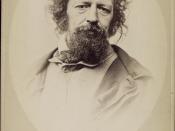Alfred, Lord Tennyson's 'Tithonus' explains mans desire for immortality gone astray. Tennyson writes the poem at a young and ambitious twenty-four years of age. This poem, however, is written three months after the death of Tennyson's best friend. His feelings toward his friend, and death in general, are depicted through his views toward immortality throughout the poem. He believes that youth is the key to usefulness and happiness. Without youth, man grows more undesirable every day while losing his affectiveness. Tennyson, by using different figures of speech and imagery, shows the speakers desire for immortality. He also creates a thought that immortality is no more than cruelty consuming man. Through this idea, Tennyson shows the consequences that follow the desire for an extension of mortal time. In the first paragraph, the speaker describes the decay of living objects as time moves on. The metaphor 'The vapors weep their burdens to the ground' exemplify the comparison between nature, man, and death.
The vapors of death bring back to Earth the old burdeness living entities that end its usefulness for life. Just as a flower, we look upon youthful man as favorable and a joy to be around. As the flower begins to decay, the flower becomes less desirable and becomes discarded. Tithonus views immortality as cruelty that consumes him. He also realizes immortality is taking away his beauty just as 'After many a summer dies the swan.' He views himself as a shadow of a man that he once was. He believes that he roams in the darkness of immortality, looking toward the ever silent East for the light of morning. He now knows that this light is no longer reachable.
The second paragraph describes Tithonus's quest to be with his lover forever and begins to realize...


